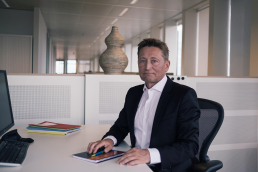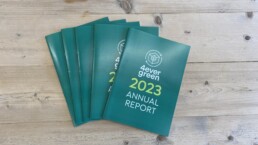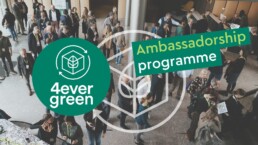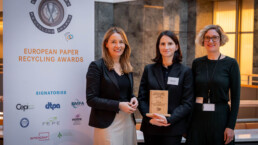
The 4evergreen alliance is an unprecedented industry collaboration. Never before have businesses and organisations from every part of the fibre-based packaging value chain joined forces for a common cause.
Events leading to the launch of the alliance were set in motion about a year ago when Jori Ringman, the Director General of Cepi – the European association representing the paper industry – was first approached by large brand owners.
“Representatives of several large consumer food and beverage brands expressed their concerns on the EU’s plans to crack down on plastic,” he says. “They wanted to know how changes in legislation would affect them.” Ringman looks back.
In March 2019, the European Parliament approved the law to prohibit single-use plastic items in EU member states by 2021. This meant banning one-use products such as plastic cutlery, plates, straws and cotton bud sticks to battle the ever-worsening plastic pollution problem.
But how would the law – dubbed the Single-Use Plastics Directive – be implemented in the case of packaging when they contain some plastic? Will a simple disposable paper coffee cup soon be banned too?
“There was a clear demand for better interpretation of the law and concrete next steps. This sparked a series of three workshops that involved players across the packaging value chain,” Ringman explains and continues. “To my surprise the participants liked this kind of holistic collaboration so much they asked if CEPI could facilitate a longer-term programme to boost the contribution of fibre-based packaging in a circular and sustainable economy.” And so, the 4evergreen alliance was born.
Answering the call
The alliance connects industry members across the fibre-based packaging value chain – from pulp, paper and board producers to packaging converters, brand owners and retailers, technology and material suppliers, waste sorters and collectors. What makes the alliance especially unique is the fact that most of the participants are not CEPI members.
“This is our chance to scrutinise the entire packaging lifecycle,” says Ringman. “We need to both make product innovations and suggest systemic changes. No single company could implement a new packaging system or recycling scheme successfully in Europe’s multicultural and multilingual environment.”
When 4evergreen kicked off in January 2020 the timing could not be better. Only a couple of weeks earlier European Commission President Ursula von der Leyen unveiled the European Green Deal aiming for carbon neutrality by 2050. And according to early estimates the circular economy will have a crucial role in the plan.
Ringman says that 4evergreen will focus heavily on making recyclability and circularity common practices.
“I think the programme’s tagline ‘Circular fibre forward’ sums up our goals quite well. Fibre-based packaging can already be recycled efficiently. We want to enhance this process even more, making the transition to a carbon neutral circular economy possible.”
He also believes the alliance will produce innovations and designs tackling waste problems.
“Sustainable packaging could phase out plastic completely and still keep the same product performance. However, we do not want to further vilify plastic. The key is to enable a higher level of recyclability and easy ways to separate plastic from paper.”
From plans to practice
The alliance involves more than 200 experts across the participating businesses and organisations. What started as a reaction to increasing legislative pressure in the EU can become a proactive driving force for the circular economy.
“The 4evergreen alliance is intended to be a two- or three-year programme. In my opinion our biggest pitfall could be if we paint with an overly broad brush. We need to define solid goals, set action plans and allocate tasks for every six or 12 months,” Jori Ringman says.
Since the timeframe is short, small task groups within workstreams were assigned to tackle concrete challenges such as standardisation of new packaging materials and how recycling infrastructure should adapt.
“The European Green Deal will be the EU’s grand plan for the next 30 years. This is our chance to stay more than relevant in the market – we can champion change with products that help societies to transition to climate neutrality.”
While consumers are not in focus, the alliance includes several retailers and brand owners who are in direct contact with them.
“It seems surprisingly unclear for many consumers what and how they should recycle. The alliance provides a perfect chance to agree on an ideal system and common messages as well as raise awareness about the benefits of fibre-based packaging materials.”
Ringman also underlines that all the solutions the alliance develops are available for everyone regardless of geographical location or business sector.
“While we are developing sustainable and circular packaging solutions for Europe, we want to be fully transparent. New findings can definitely be scaled to a global level and applied to other fibre-based products.”
Original text: © Niko Kilkki,
https://www.upmpulp.com/articles/pulp/20/making-a-big-deal-about-circularity/
A year of collaboration and growth: discover 4evergreen’s 2023 Annual Report!
We are excited to launch 4evergreen’s 2023 Annual Report, looking back at our growth and achievements from the past year and recognising…
4evergreen launches new Ambassadorship programme
4evergreen is hitting the conference floors! This year, the alliance has launched a new Ambassadorship programme that will take us to major…
4evergreen wins European Paper Recycling Award
Brussels, 20 February 2024: The 4evergreen alliance has won a prestigious award from the European Paper Recycling Council (EPRC) in the…




